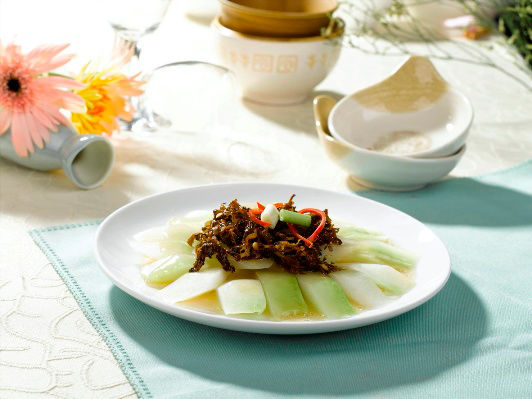Breastfeeding is the best for babies and a healthy diet / maternal nutrition is important when breastfeeding. A decision not to breastfeed can be difficult to reverse. Infant formula is suitable from birth when babies are not breastfed. It is recommended that all formula milks be used on the advice of a doctor, midwife, health visitor, public health nurse, dietitian, pharmacist, or other professional responsible for maternal and child care and the financial implications should be considered. All preparation and feeding instructions should be followed carefully as inappropriate preparation could lead to health hazards.
6 Nutrient-rich Confinement Foods After Delivery
Here are some healthy, nutrient-rich foods to include in your post-partum diet.
1. Lean Protein and Eggs
Rebuild your muscles and boost energy levels with foods that are rich in protein, iron and vitamin B, such as lean meat, fish and eggs. Popular meats in Chinese confinement recipes include pork, black chicken and fish. Beef and liver are also great sources of iron, and help mothers replenish blood loss after delivery. Another good reason to eat plenty of protein? They contain a hunger-fighting hormone that will fill you up more than carbs, aiding your postpartum weight loss!
2. Fresh Fish
Research has shown that eating foods rich in Omega-3 fatty acids, like salmon, could reduce a woman’s odds of developing post-natal depression.
To be safe, limit your intake of large fish such as shark, swordfish and tilefish as they may contain high levels of mercury. Also avoid shellfish, prawns and cockles as they may cause allergies and itchiness.
3. Grains, Seeds and Nuts
Nuts and seeds like walnuts, almonds, cashew nuts, hazelnuts, sunflower seeds and sesame seeds are all excellent sources of the good unsaturated fats like omega 3 and omega 6, protein and vitamins.
Consider Asian recipes like Chinese millet porridge, black sesame rice pudding and Indian oats porridge with honey and almonds.
4. Dairy and other Calcium-rich Foods
New mothers are recommended to prevent bone density loss by eating low-fat dairy products like cheese and yoghurt and other calcium-rich foods such as tofu, figs, beans, peas and dark leafy greens like kai lan, mustard and turnip leaves.
Sesame seeds are also rich in calcium and sesame oil is popular in Chinese and Indian confinement recipes thanks to its ‘heating’ and rejuvenating properties.
5. Vegetables, Dried Herbs and Warming Spices
Rich in antioxidants and essential vitamins, vegetables are vital to a healthy post-pregnancy diet. The Chinese sometimes try to ward off the ‘cooling’ properties of vegetables by cooking varieties like kai lan, lily buds and snow peas with sesame oil, pepper and ginger.
Many Asian cultures also use spices, dried herbs and fruit liberally in confinement soups and teas. Spices like turmeric, ginger and garlic have been used for centuries for healing thanks to their anti-inflammatory properties. Dried wolfberries, dates, longans, Chinese Angelica Root (dang gui) and Codonopsis (dang shen) are also popular in Asian soups and teas for their blood nourishing and energising benefits.
6. Nutritious Liquids
Moist foods, soups, herbal teas and juices are ideal for replenishing moisture and nutrients in new mothers and/or may have weakened digestive power. Dates, red beans, ginger and dang shen are common ingredients in Asian teas while nettles, motherwort, lady’s mantle, raspberry leaf and alfalfa can be found in western herbal infusions to help soothe and nourish the nervous system.
Immune-boosting juices and smoothies make wonderful treats, although some cultures recommend avoiding acidic fruits like pineapples, oranges, limes and lemons as they may result in excessive vaginal discharge or lochia.
Disclaimer: All content on this Website is provided solely for informational purposes and is not intended as a substitute for medical and/or other professional advice for your specific condition. Please do not disregard medical and/or other professional advice or delay seeking it because of something you have read on this Website. Always seek medical advice before starting any new treatments.

Read More

Ask Our Careline
Whatever’s on your mind, we’re here to help



